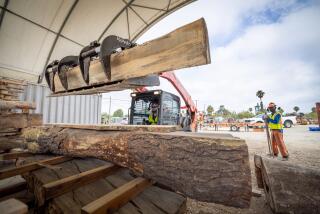Exports, Automation Cited by Study for Slump in Timber
After a two-year study of changing timber economics in the Pacific Northwest, the Wilderness Society said Wednesday that whole-log exports and automation of mills are more responsible for job losses in the region than restrictions imposed to protect the rare spotted owl.
“U.S. timber jobs are lost with every load of whole, unprocessed logs shipped overseas,” George T. Frampton Jr., society president, said in releasing the report in Washington.
About 3 billion board feet of unprocessed logs, a fourth of the trees cut in Northwest forests, are exported annually from the Pacific Northwest. Allowing logs to be cut up and finished overseas cost U.S. workers 19,200 jobs last year, according to the report. The environmental group also said 3,000 jobs annually are being lost in the area because of automation and increased productivity in the timber industry.
The society was joined in its call for efforts to curb raw-log exports by four Congress members from the Pacific Northwest who Wednesday introduced a bill to allow the states to discourage the practice by taxing exports of raw logs from private lands.
President Bush signed into law last year a ban on exporting raw logs from federal forests in the West and restrictions on most log exports from state lands.
The House bill was introduced by Reps. Peter A. DeFazio (D-Ore.), Les AuCoin (D-Ore.), Jim McDermott (D-Wash.) and Jolene Unsoeld (D-Wash.).
Timber industry officials generally rejected the Wilderness Society’s report.
More to Read
Inside the business of entertainment
The Wide Shot brings you news, analysis and insights on everything from streaming wars to production — and what it all means for the future.
You may occasionally receive promotional content from the Los Angeles Times.










